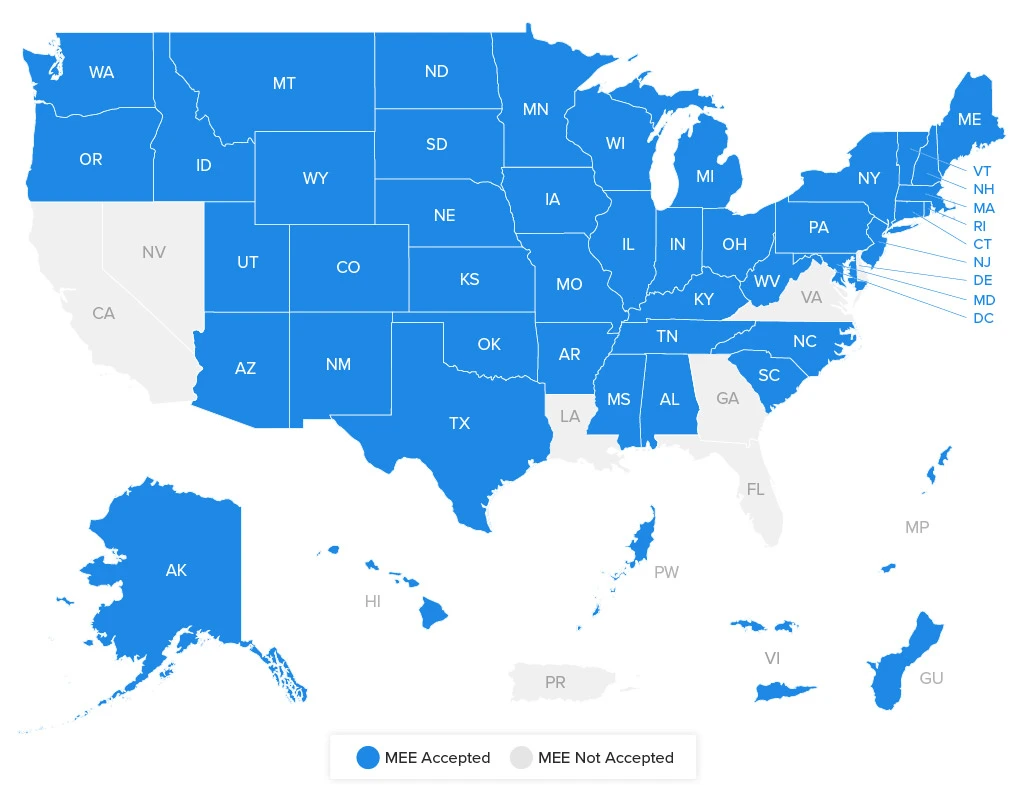The MEE was developed by the National Conference of Bar Examiners (NCBE®). It is administered by individual jurisdictions on the last Tuesday in February and July to coincide with the first day of the bar exam.
While each jurisdiction determines how much emphasis is placed on this section, it is generally weighted at 30% of the total bar exam score.
The MEE evaluates your ability to identify legal issues, distinguish between relevant and irrelevant information, and provide a well-organized, concise analysis. It also tests your understanding of fundamental legal principles. Unlike the Multistate Bar Examination (MBE®), which focuses on multiple-choice questions, the MEE tests your legal writing skills.
Jurisdictions Accepting the MEE
The MEE is accepted in most jurisdictions across the United States, including Alabama, Alaska, Arizona, and Texas, as well as territories such as Guam and the Virgin Islands. It is administered in a diverse range of locations, from New York and Illinois to Washington and Hawaii, covering nearly every corner of the country. California, Florida, Georgia, Virginia, Louisiana, Delaware, Nevada, and Puerto Rico do not accept the MEE and instead use alternative formats for their bar exams.
| MEE Accepted Jurisdictions | Alabama, Alaska, Arizona, Arkansas, Colorado, Connecticut, District of Columbia, Hawaii, Idaho, Illinois, Indiana, Iowa, Kansas, Kentucky, Maine, Maryland, Massachusetts, Michigan, Minnesota, Mississippi, Missouri, Montana, Nebraska, New Hampshire, New Jersey, New Mexico, New York, North Carolina, North Dakota, Ohio, Oklahoma, Oregon, Pennsylvania, Rhode Island, South Carolina, South Dakota, Tennessee, Texas, Utah, Vermont, Washington, West Virginia, Wisconsin, Wyoming, Guam, Northern Mariana Islands, Palau, Virgin Islands |
| MEE Not Accepted Jurisdictions | California, Delaware, Florida, Georgia, Louisiana, Nevada, Virginia, Puerto Rico |
MEE Exam Format and Weightage
The MEE consists of six 30-minute essays, totaling 3 hours. In UBE jurisdictions, the MEE contributes 30% to the overall score. Each question assesses knowledge across 12 primary subjects, ensuring a comprehensive evaluation.
Subjects Tested on the MEE
The MEE covers:
- Business Associations (Agency, Partnerships, LLCs, Corporations)
- Civil Procedure
- Conflict of Laws
- Constitutional Law
- Contracts (including UCC Article 2)
- Criminal Law and Procedure
- Evidence
- Family Law
- Real Property
- Torts
- Trusts and Estates (Decedents' Estates, Trusts)
- Secured Transactions (UCC Article 9)
To learn more about the subtopics in each subject, read our MEE subjects and topics outline.
How to Register for the MEE
To register for the MEE, you first have to register for the bar exam in your jurisdiction. The MEE is mandated in UBE jurisdictions and some non-UBE jurisdictions. This process typically involves creating an account with the NCBE, which manages bar exam applications. Be sure to review your jurisdiction’s specific requirements and deadlines in advance.
MEE Test Accommodations
Candidates with a qualified disability under the Americans with Disabilities Act Amendments Act of 2008 (ADAAA) can request accommodations, such as extra time, breaks, or alternative exam formats. Requests must be submitted to the jurisdiction’s bar authority following its process and deadlines.
The MEE is typically presented in Times New Roman, size 12 font, but alternative formats — such as Braille, large print, audio, and screen-reader-compatible documents — are available. Start the application process early to ensure timely approval and a smooth exam experience.
MEE Test Day Policies
Each jurisdiction provides specific guidelines on permitted and prohibited items. Here is a list of all prohibited items, including, but not limited to:
- Cell phones
- Digital stopwatches
- Health monitors
- Headphones
- Interpreters and translators
- Cameras
- E-cigarettes
- Shotguns, rifles, or any other kind of weapon
- Printed materials (including books and notes)
- Paper of any kind, including scratch paper
- Rulers
- Bags and backpacks
- Food and beverages
- Ear plugs
- Headgear, other than religious headgear that is pre-authorized by the testing jurisdiction
If you are caught possessing an illegal item, you most likely will be expelled from the bar exam with your scores voided. To learn more about MEE prohibitions in terms of materials and behavior, read the NCBE’s MEE Test Day Policies.
How to Study for the MEE
Preparing effectively for the MEE requires a structured and targeted approach. It involves mastering the tested subjects, developing strong analytical and organizational skills, and refining time management to craft well-structured essays under strict time constraints.
Follow these key strategies:
1. Focus on High-Yield Subjects
Concentrate on subjects that appear frequently, such as Civil Procedure and Contracts, while ensuring no topic is entirely overlooked.
2. Apply the Law, Don’t Debate
State the relevant rule and apply it directly to the facts. Avoid presenting both sides unless specifically required, and aim for a clear conclusion.
3. Organize with IRAC
Structure your responses using Issue, Rule, Application, and Conclusion (IRAC). This format ensures clarity and logical flow, which graders value.
4. Write with Precision
Focus on concise, effective legal analysis. Avoid unnecessary elaboration, and prioritize clarity and directness over length.
5. Make Answers Grader-Friendly
Use headings, paragraph breaks, and bold or underlined key terms to enhance readability and make your points stand out.
6. Practice Time Management
Train yourself to answer each essay within the 30-minute limit to ensure you can complete all 6 questions under exam conditions.
7. Attempt Every Question
Write an answer for every question, even if uncertain. Partial answers can earn valuable points, while skipped questions result in no score.
8. Practice Consistently
Simulate real exam conditions regularly. Frequent, timed practice will refine your skills and help you build the confidence needed for success.
Frequently Asked Questions
How many times can you re-take the MEE?
The number of retakes allowed varies by jurisdiction. Most jurisdictions permit you to attempt the bar exam, including the MEE, between 2 to 6 times. Check with your specific jurisdiction for its retake policy.
Can you fail the MEE and still pass the bar exam?
How many MEE questions should I practice?
When studying for the bar, aim to do as many practice MEEs as you can to expose yourself to different question types and nuances of the law. Your bar review course will generally assign 1-2 practice essays per day, and you should plan on working through at least 8 practice essays per week.
Will I fail the bar exam if I write short MEE answers?
No. The MEE prioritizes quality over quantity. Providing a concise, accurate, and well-reasoned response is more important than writing a lengthy answer. Avoid being verbose, and focus on addressing the legal issue effectively.
Do I need to apply state law to answer MEE Questions?
No. You do not need to apply state-specific law if you are taking the UBE. Instead, use majority law principles. Jurisdictions that follow the UBE assess general legal principles rather than state-specific nuances.
How long should MEE essays be?
While there’s no fixed length, a well-composed essay is typically about 1 page long. Focus on including a clear issue statement, a concise rule paragraph, an analysis, and a conclusion.





